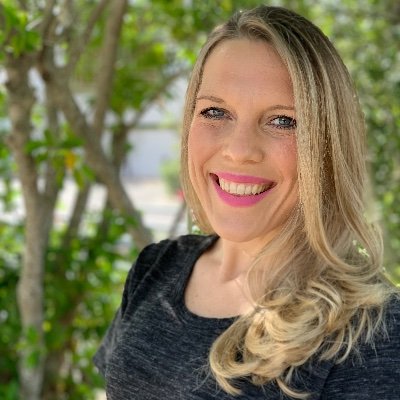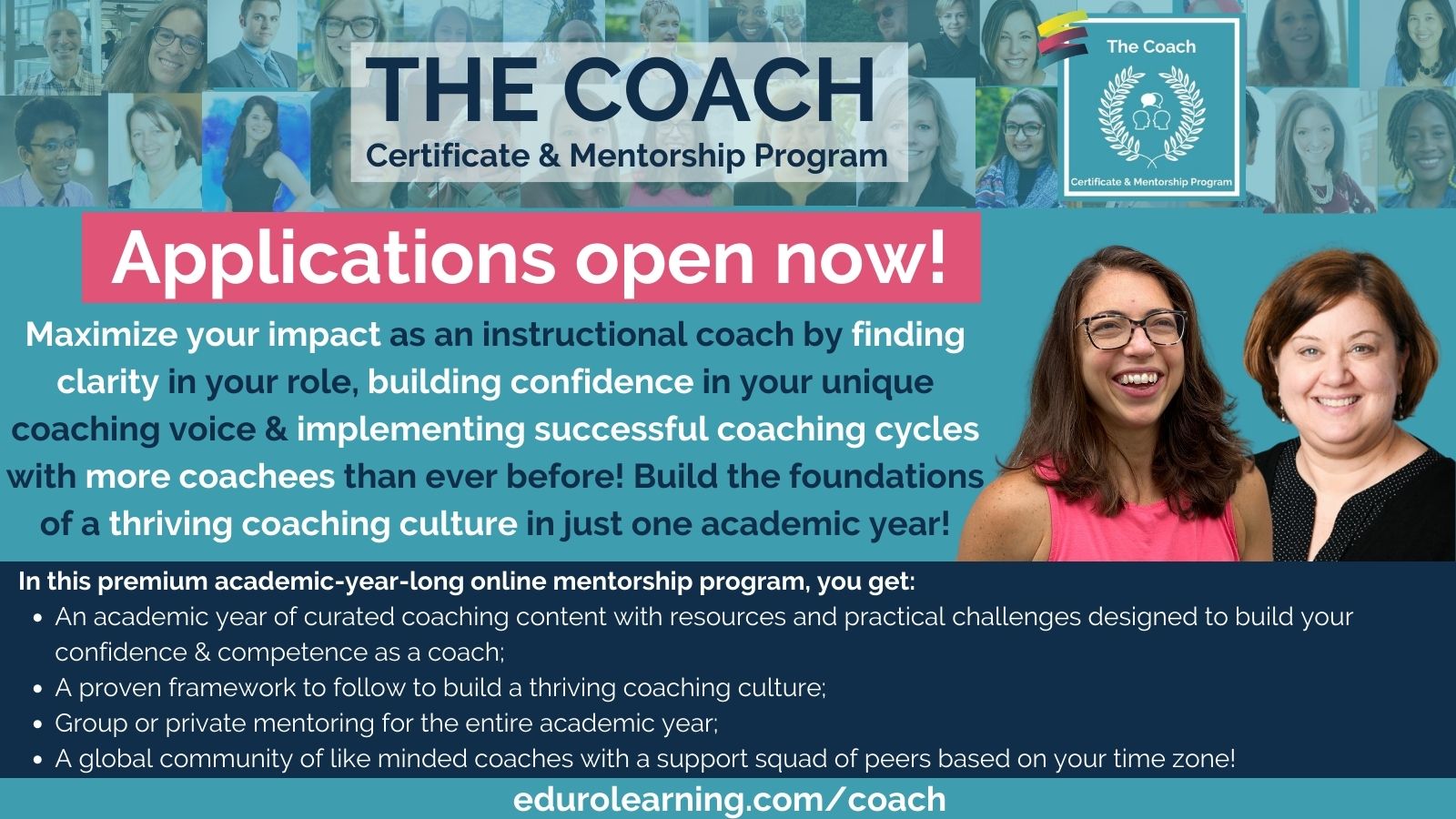In this #coachbetter episode, Kim chats with Tonya Gilchrist, Information Literacy Consultant and experienced literacy and technology coach about Tonya’s work with schools around the world, and what she’s learned about building a coaching culture. They also talk about the challenge of “impostor syndrome” as a coach and the importance of being a lifelong learner. If you’re looking for concrete examples of how to build a coaching culture, as well as how to strengthen your practice as a coach, this episode is for you!
Subscribe to #coachbetter via your favorite Podcast Player!
Featured Guest

Bonus! Watch the Spotlight Version on YouTube!
Show Notes
I spent the past several years as an MYP literacy coach. Before that, I also served as a technology integration coach. This year, I moved full-time into my role as a literacy consultant. I work with schools around the world on all things balanced literacy, inquiry and agency (both within IB and non-IB schools), translanguaging, disciplinary literacy, and more. I’m happy to dig into all or some of those topics.
What is most inspiring to you in this role
The people are always different. It’s never the same. With traveling and visiting schools, never going to the school and doing the same thing. Never doing the coaching cycle and going through the motions because every person is different. We’re never done and finished.
What are the common elements for coaching success?
Focus on relationships. As a new coach, I didn’t recognize that of course you need to build understanding and trust and become true colleagues and teammates with the people that you’re coaching. You never know what their background experience with coaches could be. It shows we’re all learners and we all want to grow. I’m not teaching you, I’m here to collaborate and grow together. I bring different skill sets, that’s why I’m a coach, but we’re in this together. Make sure they feel trusted and safe.
What are the key elements in building relationships?
Each person is unique and different. What helped me a lot was remembering that it’s not about me. It’s about helping others. It’s about the kids. Approaching it from the perspective that we all love these kids. What’s going well that we can celebrate, where do we want to go next? Keeping the focus on the kids neutralized any idea that there would be any judgment. Just like you, I’m in it for the kids. Being open-minded to listen to that teacher, I might have a toolbox but the teacher might name something else and I need to be open to that. Coaching is like conferring with a kid : you go in with ideas that you might coach into, but you have to be open to the fact that they might lift something else up. Responsiveness. When people genuinely see that you are open,
What’s YOUR level of coaching mastery?
All coaches go through various stages of coaching mastery. Once you identify where you’re at, you can begin to build the skills needed to move to the next stage.
This quiz is based on real-life case studies compiled from years of working with coaches inside The Coach Certificate & Mentorship Program!
When you receive your results, you’ll also get your matching case study from the STRIVE Case Studies to see where you fit in the stages of coaching mastery.
Ready to tackle your challenges and move on to the next level in YOUR coaching practice?

The STRIVE Model of Coaching Mastery quiz will help you identify your level of coaching mastery by matching you with case studies compiled from years of working with coaches inside The Coach Certificate & Mentorship Program so you can easily see where you fit!
When you complete the quiz, you’ll get:
- Your matching case study,
- Specific strengths & challenges aligned to your result;
- Suggested next steps for each stage;
Plus the Case Study Document includes:
- Case studies leveled by coaching mastery;
- A framework to identify essential stages of professional growth & key areas to focus on in your professional learning;
- Alignment with the THRIVE Model for a Successful Coaching Culture;
- Space for you to reflect & prioritize so you can take action immediately!
You’ll go straight to the Quiz, and get the Case Study Document via email.
Show Notes continued…
Any commonalities in the schools that you’ve visited?
The more schools that I work with. No matter what, one thing that’s true is that every school is totally different. There’s not one right answer, not one right way to build coaching.
One of the things that people are grappling with is time. The logistics of time management. Feeling really stretched thin. How do I make time?
Quality over quantity. Less is more. Instead of trying to do more more more. Let’s look at wht we’re doing and do it really well. Instead of trying to do six cycles while you’re also teaching a class, try to do two at a time. The work you do will be deeper if you focus in on quality over quantity. In order to make the most of your time, define your role. What is your role. A lot of time the coach gets put into things that aren’t coaching related.
Coaching is about relationships, so you can fall into a struggle of not wanting to say no. If you can define the role from the start, you’re avoiding a lot of those really uncomfortable conflicts.
Imposter syndrome
Especially this year, my work as a consultant, finding myself in a new role doing something new at a faster pace. Everyone has moments of self-doubt. There are going to be moments when you don’t know the answer, but that’s a beautiful thing to lean into. Instead of feeling not worthy, think of it as an opportunity to learn. Learning is lifelong. We always have room to grow. Being open and genuine. When we feel those moments of self-doubt, paying attention to what’s happening. What do the results say? When you look at the data, you can see that you have made a difference. None of us are perfect. All of us have room to grow. I’m making a positive difference. Look at those results when you feel not worthy. Instead of listening to that critic in your head.
There is no perfect. Imperfections is where the learning happens. The people you’re working with need to see you as a learner too. Acting like you know everything can actually do some damage. Instead live the role of being a lifelong learner.
Any challenges as a coach / consultant? What did you do to resolve it?
“All of that sounds fantastic, but you haven’t been in my class with my kids” Have labsites on every visit, work with their kids. It’s so powerful to see their kids get to a new mode of thinking. This isn’t “crazy and scary” – it’s fun and full of learning.
Agency is important for kids, and teachers and school leaders to own what they’re doing.
The endgame is that we want them learning and thriving on their own. During a demo lesson, giving a lab guide for things to look for or things to think about, so that when we debrief there are things to think about. As a coach, when you’re doing a demo lesson have some specific look fors and things to think about. That can help lead to the end game because you’re havign them notice the moves you’re making or the kids are making. Where do you see inquiry? Where do you see responsiveness to kids? Could be the focus of the coaching cycle. Make it a part of your reflective discussion, so “next year, when you’re doing this on your own what would you change or maybe do differently? Or what would you want to keep?”
4 square: what did you notice = what have you decided together to look for
4 look fors
What do you wonder
Tonyagilchrist.com (blogs, podcasts, contact me)
@mrs_gilchrist
tonya@erinkentconsulting.com
Level Up Your Coaching with The Coach!
If you are ready to dive deep into your coaching practice, to help you #coachbetter and build a thriving coaching culture in your school, please join us for our next cohort of The Coach!
Wherever you are in building a coaching culture in your school, The Coach will give you the strategies, skills and tools you need to make coaching a success and will empower you to confidently apply instructional coaching strategies in any situation – from building a coaching program, to having coaching conversations, to being a leader in your school community. We facilitate only one cohort each academic year so we can offer individualized support for each participant.
Coaches of all levels are welcome: you’ll start the program with a self-assessment to determine exactly what the next steps are for you!






Recent Comments